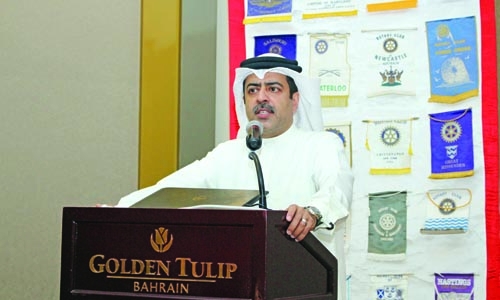‘Curb skill gap’
Manama : The private sector needs to connect with educational bodies and universities in order to curb the skill gap in the job market, said a top LMRA official yesterday.
“We want to help you hire Bahrainis and not force you to hire them,” said Labour Market Regulatory Authority (LMRA) CEO Ausamah Al Absi while addressing businessmen at a meeting organised by Rotary Club of Sulmaniya at Golden Tulip Bahrain in Manama.”
Al Absi, however, confirmed that authority would continue to encourage businesses to hire Bahrainis.
Voicing his concerns regarding the skill gap, Al Absi opined that this phenomenon could be addressed through proper interaction between the private sector, educational authorities and universities in the Kingdom.
“There has always been a disconnect between the private sector and the education authorities and universities,” he viewed.
Al Absi, however, said LMRA can make some interpretations based on the work permits applications, but that is not the solution. “We need you to tell us what your requirements are, what type of graduates you need and do not need,” he urged.
Earlier this week, the Ministry of Labour and Social Development signed a Memorandum of Understanding (MoU) with Tamkeen to grant incentives for hiring Bahrainis.
While outlining the benefits of hiring local talents to the economy and highlighting the need for the private sector to work closely with educational bodies and universities to fill the skill gap in the job market Al Absi said, “We will assist you, we will create every possible avenue for you to hire local talent.”
Highlighting the agreements and good relationship LMRA enjoys with higher education councils and universities, he, however, said that the “solution is still engaging with the education sector and explaining them the market needs”.
On the economic challenges, he said that the free market available to Bahrain’s growing private sector would help the Kingdom stay ahead.
Acknowledging the paradigm shift brought out by the deregulation measures introduced a year and a half ago, he said that this has “helped us adjust to the challenges”.
“In 2014 when the oil crisis hit, investments and government spending were cut short and businesses started to feel the pinch. We took the decision that we will stay ahead of the curve, that we will change the way we operate because we cannot control the changes.
“So we have to be ahead of the curve, not that we have to predict what is going to happen but to be able to react quickly.
“This is why we started deregulating, instead of taking the lead in reacting on your behalf, we want to give the businesses the ability to react as they see fit,” he said.
Related Posts

